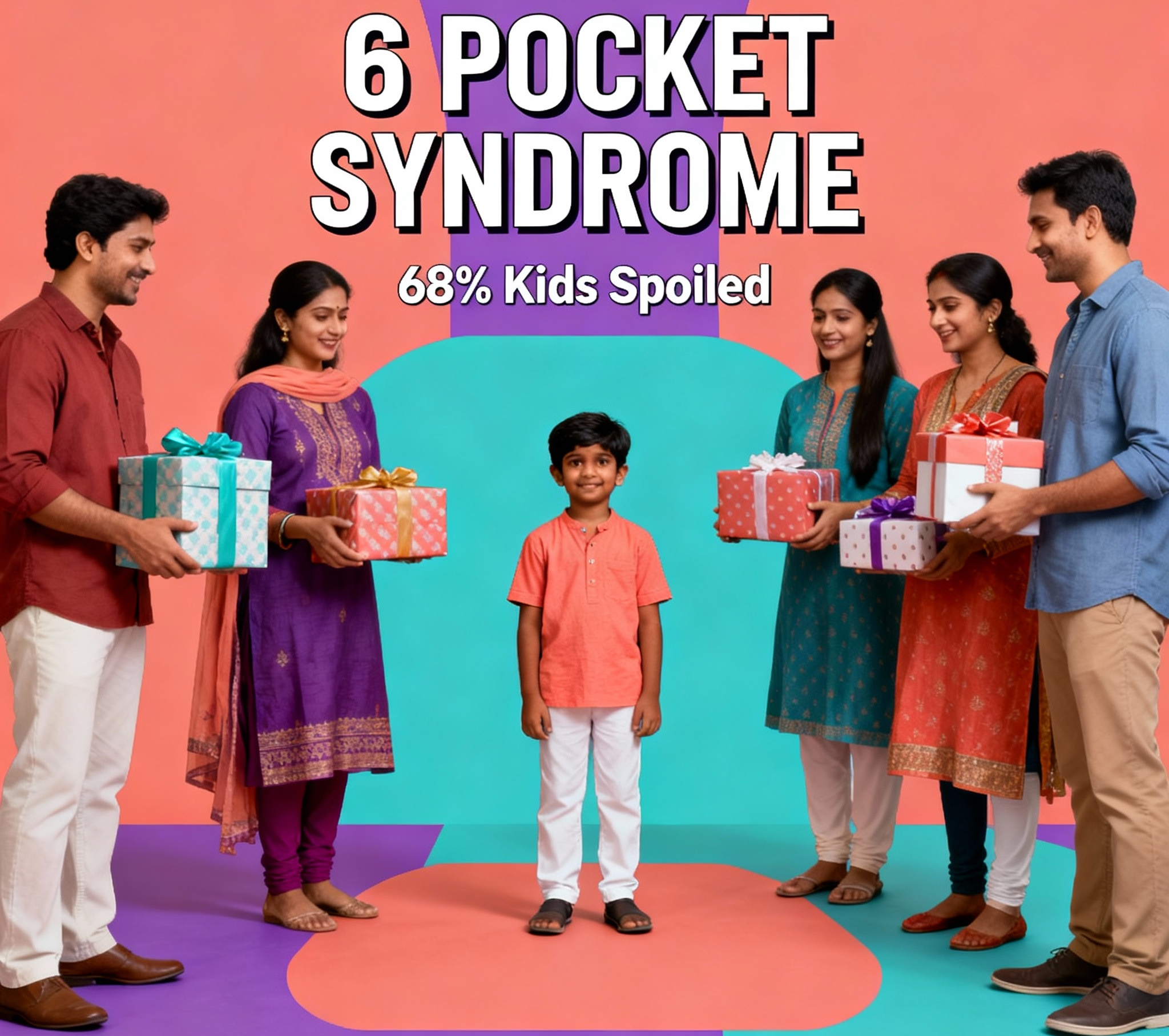6 Pocket Syndrome: Why Indian Kids Are Overindulged (2025)

6 Pocket Syndrome explained: 6 adults spoil 1 child in India. 68% urban kids show entitlement.
6 Pocket Syndrome: Why Indian Kids Are Overindulged
One child, 6 adults (2 parents + 4 grandparents) = Entitlement epidemic. 68% of urban Indian kids show spoiled behavior. Expert solutions to prevent overindulgence & raise resilient children.
Understanding the Modern Parenting Crisis
Last Updated: November 2025 | The term “6 Pocket Syndrome” originated in China during its one-child policy era (1979-2015), describing how one child was doted on by six adults—two parents and four grandparents—who poured all their affection and financial resources into them.
In India, this phenomenon has become alarmingly common in urban middle-class families, where working parents and indulgent grandparents shower children with attention, gifts, and excessive leniency. According to a 2021 NIMHANS study, 68% of urban children aged 5-12 show entitlement traits linked to overindulgence.
🚨 The Alarming Reality in India:
- Working Parents’ Guilt: Limited time with children leads to overcompensation through material gifts
- Grandparents’ Indulgence: Four grandparents competing to spoil the one grandchild
- 30-40% Higher Spending: Single-child families spend significantly more on discretionary items (Child Development Review, 2020)
- No Boundaries: Children learn to demand instantly and expect to be rewarded without effort
- Emotional Imbalance: Love becomes equated with material rewards rather than quality time
🔍 The “Six Pockets” Explained
The term refers to six sources of income and attention focusing on one child:
- Pocket 1 & 2: Mother and Father (often working, guilt-driven gift-giving)
- Pocket 3 & 4: Paternal Grandparents (traditional indulgence, compensating for parental absence)
- Pocket 5 & 6: Maternal Grandparents (competing to be the “favorite,” showering gifts)
This creates an ecosystem where the child becomes the center of the universe, with every wish fulfilled, every tear dried immediately, and every demand met without question. The result? A generation of children who’ve never experienced delay, denial, or disappointment.
🇮🇳 Indian Context: The Cultural Shift
Dr. Darshi from NDTV Health explains: “India is witnessing a shift from a responsibility-based society (where children contribute and adapt) to a right-based society (where children feel entitled to comfort and attention).”
In traditional Indian joint families, children learned sharing, patience, and respect for elders through daily interactions with siblings and cousins. Today’s nuclear families, combined with smaller family sizes and higher disposable incomes, have created the perfect storm for 6 Pocket Syndrome.
Psychological and Behavioral Effects
Research published by Drishti IAS (2025) and studies from NIMHANS reveal alarming consequences of 6 Pocket Syndrome on children’s development:
Low Frustration Tolerance
Children cannot handle rejection, denial, or criticism. When told “no” for the first time outside the family, they experience severe emotional distress, tantrums, or aggression.
Reward-Demanding Behavior
They associate love with material rewards and expect instant gratification. “If you love me, buy me this” becomes the default emotional language.
Emotional Immaturity
Limited capacity for patience, empathy, or self-control. Children struggle to understand others’ perspectives and show egocentric behavior well into teenage years.
Dependency & Fragility
Struggles with autonomy and resilience when facing failure or peer pressure. Simple challenges become insurmountable obstacles without adult intervention.
Poor Social Skills
Difficulty forming and sustaining friendships because sharing and compromising are foreign concepts. Peers avoid them due to demanding behavior.
Material Obsession
Overly focused on possessions over experiences or relationships. A new smartphone matters more than a family trip or adventure.
⚠️ Long-Term Consequences (Research-Based):
- Mental Health Crisis: Increased vulnerability to aggression, substance abuse, anxiety, and depression in adolescence
- Relationship Struggles: Ego-centric behavior strains romantic relationships and friendships in adulthood
- Career Challenges: Inability to handle workplace criticism, rejection, or competition
- Lack of Life Skills: Basic self-sufficiency tasks (cooking, cleaning, budgeting) remain unlearned
- Entitlement Mentality: Expectation of special treatment in all spheres of life, leading to disappointment and anger
🎭 Sociological Perspectives
Erving Goffman’s “Dramaturgical Perspective”: Modern children, shaped by family and media, learn to perform roles that attract validation rather than build character. Childhood becomes a stage for social approval (Instagram likes, YouTube views) rather than moral learning.
Zygmunt Bauman’s “Liquid Modernity”: Society now prioritises instant gratification, fluid identities, and social visibility over long-term emotional grounding. Children in 6 Pocket Syndrome are the embodiment of this shift.
🎯 Is Your Child Experiencing 6 Pocket Syndrome?
Take this 4-minute assessment to identify warning signs
How to Prevent & Reverse 6 Pocket Syndrome
According to Dr. Darshi (NDTV Health) and child psychologists across India, prevention and reversal require coordinated family effort and consistent boundaries. Here are research-backed strategies:
🛡️ 7 Proven Prevention Strategies
1. Family Alignment Meeting
Parents AND all 4 grandparents must agree on boundaries. Create written family rules about gifts (max 1/month), discipline (no undermining), and rewards (earned, not given).
2. Time Over Gifts
Replace material gifts with quality time experiences. Instead of a new toy, take them to the park, read together, cook a meal. Emotional connection > possessions.
3. Age-Appropriate Responsibilities
Assign daily chores (making bed, setting table, organizing toys). Children need to contribute to the household to develop self-worth beyond being pampered.
4. Learn to Say “No” Lovingly
“I love you, but we’re not buying that today.” Denial teaches delayed gratification and emotional regulation. Minor disappointments build resilience.
5. Earned Rewards System
Link privileges to effort and behavior, not demands. “You can have screen time after completing homework.” Rewards become motivators, not entitlements.
6. Encourage Social Interaction
Regular playdates, group activities, team sports. Learning to share, compromise, and cooperate with peers is essential for emotional intelligence.
7. Teach Gratitude Actively
Daily gratitude practice: “What are 3 things you’re thankful for today?” Model gratitude yourself in conversations with grandparents and spouse.
8. Stop Comparison Trap
“Sharma ji’s son has this” shouldn’t dictate purchases. Teach: We have what we need, not everything we want. Contentment > competition.
💚 Success Story from Kideos Station Community:
“Our 7-year-old daughter was classic 6 Pocket Syndrome – tantrums when denied, zero gratitude, expected new toys weekly from all grandparents. We had a family meeting, set strict boundaries (gifts only on birthdays), introduced daily chores (she makes her bed, feeds the dog), and replaced gift-giving with experience-giving (grandparents take her to museum, not mall). Within 3 months, transformation! She now says thank you unprompted, shares with cousins, and hasn’t thrown a tantrum in weeks. The key was getting ALL 6 adults on the same page.”
— Priya K., Bangalore, mother of 7-year-old
🩺 When to Seek Professional Help
Dr. Darshi recommends seeking behavioral therapy or counseling if your child:
- Consistently exhibits severe behavioral issues (aggression, property destruction)
- Struggles significantly with peer relationships (no friends, rejected by classmates)
- Shows emotional instability (frequent meltdowns, inability to self-regulate)
- Displays signs of anxiety or depression when denied material requests
Early intervention through positive behavioral therapy can dramatically improve socialization and emotional adjustment.
What Psychologists & Researchers Say
🔬 Research Findings (2020-2025):
- NIMHANS Study (2021): 68% of urban Indian children aged 5-12 show entitlement traits linked to overindulgence
- Child Development Review (2020): Single-child families spend 30-40% more on discretionary items than families with siblings
- Meta-Analysis by Toni Falbo & Denise Polit: Reviewed 100+ studies – only children perform equally on social adjustment and empathy when boundaries exist
- Stanford University (2024): Excessive screen time + overindulgence = measurable brain structure changes affecting critical thinking
- Indian Express (2025): “From responsibility-based to right-based society – Indian children now expect to be served rather than contribute”
Key Insight from Experts: “The myth that only children are automatically spoiled is FALSE. What matters is parenting style and emotional environment, not family size. An only child raised with warmth, boundaries, and opportunities for independence can be just as (or more) balanced and empathetic as children with siblings.” — Clinical Psychologist quoted in India Today
📺 The KBC Viral Moment: What Really Happened?
In October 2025, a young contestant on Kaun Banega Crorepati interrupted Amitabh Bachchan with “I know the rules, you don’t have to tell me.” The clip went viral, igniting nationwide debate:
- Social Media: Split opinion – some admired his confidence, others labeled him arrogant and spoiled
- Psychologists Weighed In: This behavior likely reflects 6 Pocket Syndrome, but also shows assertiveness and intelligence
- The Real Issue: Society often misreads confident children as arrogant when the actual problem is lack of boundaries at home
Expert Perspective: “The KBC kid’s moment is a mirror to modern parenting. Confidence and curiosity should be nurtured, not criticized. But when paired with entitlement and lack of respect for elders, it signals overindulgence. The solution isn’t to crush confidence—it’s to balance it with empathy and boundaries.” — Parenting Expert, Hindustan Times
🌟 Raise Confident, Grounded Children
Join the Kideos Station community of 100,000+ parents committed to balanced, research-based parenting. Get free resources, expert guidance, and supportive community.
Visit Kideos Station → Read More Parenting Tips →✨ Kideos Station – Empowering Indian Parents with Science-Based Parenting Solutions Since 2020
💡 Key Takeaways
🎯 Remember:
- 6 Pocket Syndrome is REAL in urban India – 68% of kids show entitlement traits
- It’s not about being an only child – it’s about overindulgence and lack of boundaries
- Prevention requires ALL 6 adults to align on consistent rules and discipline
- Time > Gifts: Emotional connection matters more than material possessions
- Teach responsibility early: Age-appropriate chores build self-worth and resilience
- Say “no” lovingly: Denial teaches delayed gratification and emotional regulation
- Model the behavior: Children mirror what parents and grandparents demonstrate
- Seek help early: Behavioral therapy works if intervention happens before adolescence
Your child’s emotional intelligence, resilience, and future relationships depend on the boundaries you set TODAY. 6 Pocket Syndrome is preventable and reversible with coordinated family effort.
Start with ONE change this week. Have the family alignment meeting. Introduce one daily chore. Practice saying “no” to one unreasonable demand. Small consistent actions create lasting transformation.
For more expert parenting guidance, visit Kideos Station – India’s trusted parenting resource with 100,000+ parents in our community! 🌈

